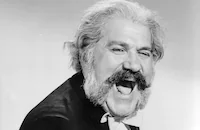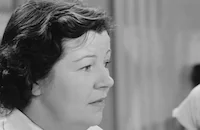Tennessee Champ

Brief Synopsis
Cast & Crew
Fred M. Wilcox
Shelley Winters
Keenan Wynn
Dewey Martin
Earl Holliman
Dave O'brien
Film Details
Technical Specs

Synopsis
At a late night poker game in Vidalia, a small town on the Mississippi, crooked gambler Willy Wurble is about to be exposed for cheating when the other players are distracted by the sound of an altercation on the pier outside. From the window they see Daniel Norson defending himself and a young woman against the pipe-wielding Sixty Jubel and two thugs. When Daniel hits him, Sixty Jubel falls and hits his head against a metal drum. Daniel escapes the thugs by diving into the river. Meanwhile, as the other gamblers discover that the money in the poker pot has been stolen, Willy escapes in a row boat. Some distance from shore, Willy finds Daniel struggling in the water and rescues him. As they row away, Daniel says that a stranger in town named Sixty Jubel made a pass at Daniel's girl friend Blossom at a recent dance, then ambushed the couple earlier that evening. The deeply religious Daniel confesses that he killed Sixty Jubel, and says his late father was a preacher. When they reach the shore in Natchez, Willy gives Daniel some money, then calls his wife Sarah from a hotel pay phone. The following morning, Sarah arrives with Happy Jackfield, a slow-witted young boxer whom Willy manages. Willy and Happy encounter Daniel in the street, and when Willy notices the young man's powerful build, he offers to turn him into a prize fighter. Believing that God has sent Willy to him for a reason, Daniel agrees. Willy takes Daniel--whom he dubs the "Tennessee Champ"--to small-time fight promoter J. B. Backett and proposes he fight Happy in a fixed match. After a hasty boxing lesson, Daniel finds himself in the ring with Happy, who pummels him with illegal rabbit punches and kidney blows until the sweet-natured Daniel gets angry and knocks him out. Willy convinces Daniel it is the Lord's will that he continue boxing, and the young man moves in with the Wurbles and begins a serious training program. One night, Daniel donates a portion of his winnings to a local church, and he and the Wurbles are invited to attend services. Daniel addresses the congregation with natural ease, and later tells Willy that his goal is to finish work on the church his father started building. Daniel's boxing career progresses, and one night Willy is visited by his old friend, crooked boxing manager Luke MacWade, who suggests a match between their fighters in St. Louis. Willy insists that MacWade's boxer throw the fight, and MacWade agrees if Willy will put up all the promotion money. Over Sarah's objections, Willy uses Daniel's earnings and pawns her engagement ring to raise the cash. The night of the match, MacWade bribes Happy to rub sand in Daniel's eyes so that he will lose the fight. Perplexed, Happy talks to Daniel and reveals that the fight has been fixed. Daniel angrily refuses to fight, despite Willy's protests that canceling the event will bankrupt him. Willy is touched by Daniel's integrity, however, and later receives a sudden inspiration that sends him to Memphis in the middle of the night. Several weeks later, Willy sends for Sarah, and she is surprised to discover that he has arranged for Daniel's church to sponsor a match between Daniel and the undefeated "Biloxi Block Buster." Assisting Daniel is Happy, who repented for his earlier actions and has hitchhiked from St. Louis to be with him. Daniel tells Willy that he plans to surrender to the police in Vidalia after the fight. When the opponents face each other in the ring, Daniel is stunned to learn that the other fighter is actually Sixty Jubel. The two men fight fiercely, and Daniel takes a terrible beating before knocking Sixty Jubel out. After the match, Daniel finds Blossom waiting for him. Daniel tells the assembled reporters that after he and Blossom marry, he will retire from the ring and take his father's place as deacon of the church in Vidalia. Willy privately assures Sarah that Daniel will have enough money to build his church, and as Sarah remarks upon the improvement in her husband's character, he slips her engagement ring back on her finger.

Director

Fred M. Wilcox
Cast

Shelley Winters

Keenan Wynn

Dewey Martin

Earl Holliman

Dave O'brien

Charles Buchinsky

Yvette Dugay
Frank Richards

Jack Kruschen
John Indrisano
Charles Sullivan
Harold Tommy Hart
Mike Pat Donovan
Alvin J. Gordon
Paul Hoffman
Bruno Ve Sota
John Damler
Fred Welch
John Logan
Rube Schaffer
Louis Mason
Court Shepherd
Paul Bryar
Howard Wright

Dan White
William Lewin
Brad Hatton
Tom Daly
Hope Miller
Dick Haynes
Dick Simmons
David Bair
Dave White
Than Wyenn
Mickey Mccardle
William Newell
Billy Mclean
Al Hill
Harry Cody

Margaret Bert
Don Anderson
Crew
Peter Ballbusch
Ralph Blane
Daniel B. Cathcart
Art Cohn
Alvord Eiseman
Sol Baer Fielding
George Folsey
Cedric Gibbons
Sydney Guilaroff
John Indrisano
Arthur Krams
Ben Lewis
Conrad Salinger
Douglas Shearer
Marvin Stuart
William Tuttle
Harry Warren
Edwin B. Willis

Film Details
Technical Specs

Articles
Tennessee Champ
Here Winters plays Sarah Wurble, whose husband, Willy (Keenan Wynn), is manager for an illiterate, God-fearing boxer, Danny Norson (The Thing from Another World's [1951] Dewey Martin). Gifted with a powerful punch and a nickname that provides the film's title, Danny's hiding a terrible secret, believing he impulsively killed another man, and his religious convictions turn out to be a source of conflict when Willy urges him to throw a fight. On top of that, fate has another twist in store that may either absolve Danny or send him into a tailspin. < BR>
Mounted as a title to fill out double and triple bills, Tennessee Champ was one of several films Metro-Goldwyn-Mayer shot in its pet process of Anscocolor, a ruddy-looking process also employed on the same year's Brigadoon. The quality of the finished film and its enduring appeal among film fans is fortunate given the studio's enormous output that year, which saw the film's promotion often overwhelmed by other, more prestigious titles from MGM around the same time like Executive Suite, Seven Brides for Seven Brothers, Beau Brummell, and The Last Time I Saw Paris.
In fact, Tennessee Champ had been gestating within the studio's offices for many years, with MGM records for it going back well over a decade. Writer Eustace Cockrell was noted for his short stories in various popular publications, several of which were optioned by MGM and sent around for consideration. Four of his stories from Argosy Weekly were picked up from his "Refugee Smith" series: "Marching as to War," "The Lord in His Corner," "Refugee Returns Home," and "Love Came Borrowing." A fifth Refugee Smith story, "Shoeshine Boy," appeared later in Collier's and was also snagged by MGM, and Cockrell himself submitted a 17-page treatment under the title Refugee Returns Home in October of 1942.
Later that same month and into February of the following year, Cockrell worked on an updated treatment, now called The Lord in His Corner, after which it evolved into the more generic title of Refugee Smith, with a new treatment written by Howard Estabrook. The project languished for several years but was put back on track when another Cockrell story was adapted by MGM as Fast Company in 1953, starring Howard Keel. In the meantime Cockrell had become a prolific TV writer, working (sometimes uncredited) on such programs as Maverick and Have Gun Will Travel and adapting another of his boxing stories, "The Count of Ten," for a 1954 episode of The Loretta Young Show.
The revived version of Cockrell's big screen sports drama was then entrusted to screenwriter Art Cohn, who had earlier written the 1949 boxing noir The Set-Up for director Robert Wise. In March of 1953, Cohn turned in a new screenplay from the same source material, now entitled Sunday Punch and largely using material from "The Lord in His Corner" along with elements of the other stories. Cohn also did significant research into the story's biblical references, turning in a taut 90-page final script. Producer Sol Baer Fielding also added six pages of additional scenes, and the final stamp of approval was given by September of the same year, at which point the title had finally reached its final incarnation as Tennessee Champ. Tragically, Cohn would die four years later in a plane crash with film producer and Todd-AO pioneer Mike Todd, about whom he was writing a biography.
Directing duties were handed to Fred M. Wilcox, a longtime MGM veteran (and brother of actress Ruth Selwyn) who began in the studio's publicity department during the silent era and directed such films as Lassie Come Home (1943) as well as an earlier Keenan Wynn film, Code Two (1953). However, his most famous film for MGM would be his last: Forbidden Planet, the 1956 science fiction classic featuring one of Tennessee Champ's scene-stealing co-stars, Earl Holliman.
Another co-star in the film, Charles Buchinsky, should also look familiar to movie fans. The young actor who plays "The Biloxi Blockbuster" in the ring had just appeared a year earlier in House of Wax, and within a year he would change his name to one that would make him one of the screen's most memorable tough guys: Charles Bronson.
Appropriately, Tennessee Champ premiered in Memphis, Tennessee on February 25, 1954. About to embark on the busiest and most acclaimed phase of her career, Winters received top billing and occupied the majority of the trailers and poster art, which alluded to one of the former titles with the tagline, "It's fun and thrills when Bombshell Shelley takes on a guy with a Sunday punch!"
Producer: Sol Baer Fielding
Director: Fred M. Wilcox
Screenplay: Art Cohn; Eustace Cockrell (story)
Cinematography: George Folsey
Art Direction: Daniel B. Cathcart, Cedric Gibbons
Music: Conrad Salinger
Film Editing: Ben Lewis
Cast: Shelley Winters (Sarah Wurble), Keenan Wynn (Willy Wurble), Dewey Martin (Daniel 'Danny' Norson aka Tennessee Champ), Earl Holliman (Happy Jackfield), Dave O'Brien (Luke MacWade), Charles Buchinsky (Sixty Jubel aka The Biloxi Blockbuster), Yvette Duguay (Blossom), Frank Richards (J.B. Backett), Jack Kruschen (Andrews, Fight Promoter)
C-73m.

Tennessee Champ
Quotes
Trivia
Notes
Hollywood Reporter production charts include Herb Vigran in the cast, but he was not in the released film. The Variety review noted that in the story "The Lord in His Corner," the character of the pious boxer was African American.

Miscellaneous Notes
Released in United States Winter February 1954
Released in United States Winter February 1954














